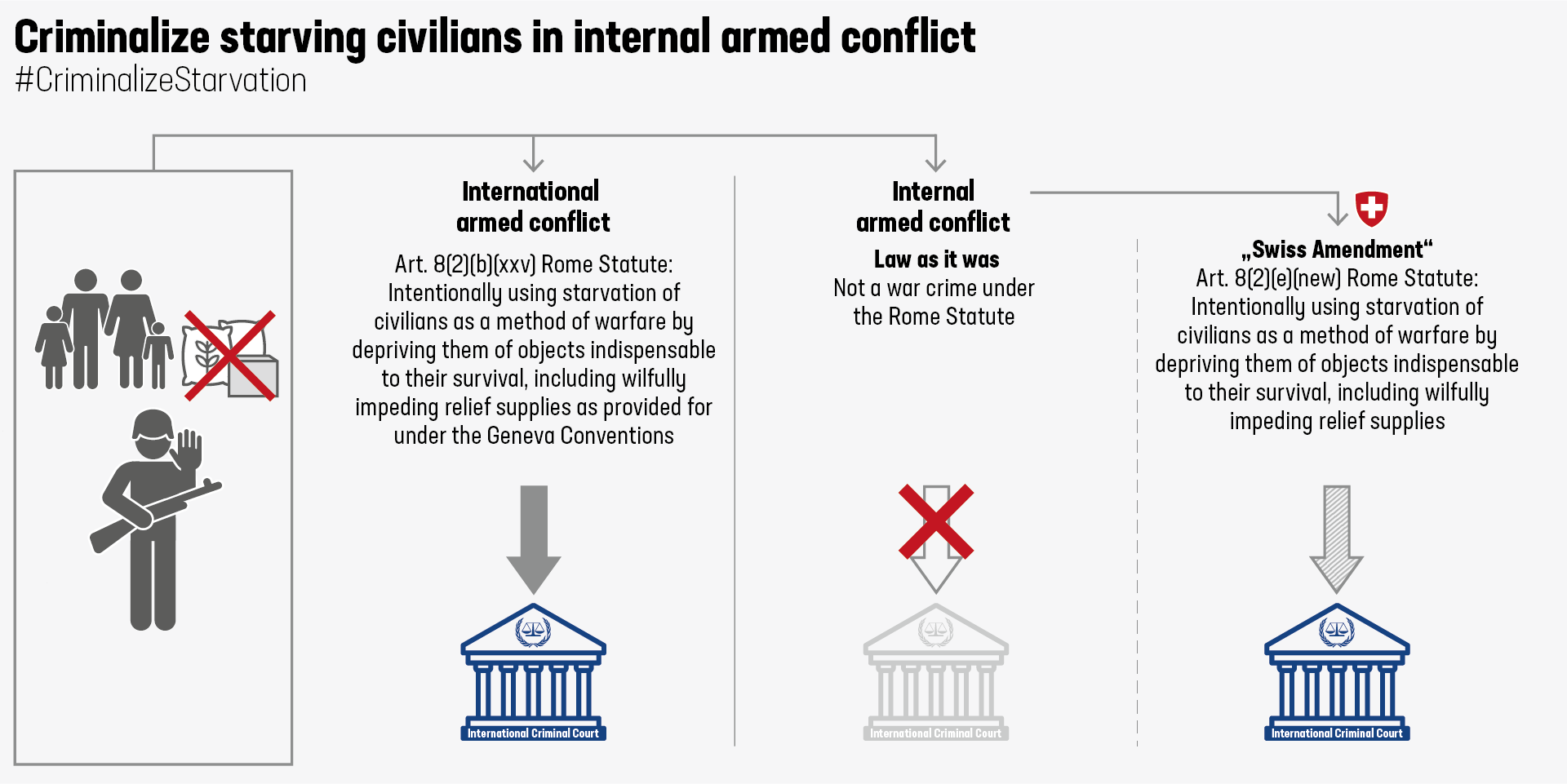A strong signal in the fight against famine during armed conflict
Switzerland deems the starvation of civilians as a method of warfare to be a war crime, regardless of the type of conflict (international or civil war). It has proposed that the Rome Statute of the International Criminal Court (ICC) be amended so as to have this recognised more widely at international level.

A girl in the malnutrition ward of al-Sabeen Maternity and Childhood Hospital in Sana'a, Yemen. © Keystone
Civil wars cause people to suffer in ways that the world remains largely unaware of. Cities come under siege by the warring parties, preventing the supply of food by land, air or sea. All too often, aiming to starve civilians, the parties deliberately attack objects indispensable to the survival of the civilian population, such as foodstuffs, agricultural areas, crops, livestock and drinking water supplies. During war, some resort to the 'might is right' principle; the more the other side suffers from hunger, the less resistance it will be able to put up.
In countries currently in the throes of violent armed clashes between government forces and armed groups, civilians are paying a heavy price. In Yemen, this reality is tangible. Since the conflict escalated in 2015, the country has been plunged into an unprecedented humanitarian crisis, a grave emergency in which the population is suffering from acute malnutrition or undernourishment, or even starving. According to the Food and Agriculture Organization of the United Nations (FAO), the United Nations Children's Fund (UNICEF), the World Food Programme (WFP) and the World Health Organization (WHO), food shortages are directly endangering the lives of 2.3 million children. The same sources reveal that in 2019 687 million people were undernourished or malnourished worldwide. A majority of these people lived in conflict zones.
A success for Swiss diplomacy
Indeed, Yemen is not an isolated case; in many parts of the world, civil wars give rise to similar disasters. But food insecurity is not inevitable, nor is it a twist of fate, and the international community can and must do more to prevent and alleviate this. Building on its humanitarian tradition, Switzerland proposed an amendment to the Rome Statute of the ICC to make the intentional starving of civilians a war crime, regardless of the type of conflict. This method of warfare was previously only prosecutable by the ICC as a war crime when employed during international armed conflicts, i.e. wars between states.
Thanks to extensive diplomatic efforts, Switzerland's arguments convinced more and more of the other 122 States Parties to the Rome Statute. They unanimously adopted the amendment on 6 December 2019. Federal Councillor Ignazio Cassis, the head of the Federal Department of Foreign Affairs, acknowledges his country's role: "Switzerland received a great deal of recognition for its initiative and the way it carried out the whole process."

Commitment consistent with the objectives of the Foreign Policy Strategy 2020–23
At its meeting on 19 May, the Federal Council referred to the Federal Assembly the dispatch to approve the amendment to the Rome Statute. This addition to the Rome Statute contributes to preventing intentional starvation and to ending impunity for the perpetrators of war crimes. It bolsters the ICC's effectiveness, implements international humanitarian law and supports humanitarian aid efforts. Accordingly, Switzerland's ratification of the amendment would help achieve the objectives of the Federal Council's Foreign Policy Strategy 2020–23 (FPS).
In order to combat impunity effectively, those who starve civilians as a method of warfare must no longer be able to escape criminal sanctions. Therefore, it is important at this stage that the States Parties ratify the amendment and make it a crime, under national law as well, to starve civilians. Switzerland's ratification will encourage other States Parties to proceed accordingly.
Interview with Ambassador Corinne Cicéron Bühler, Head of the Directorate of International Law

This amendment, proposed by Switzerland, protects civilian populations in war zones while also helping to resolve conflicts in a sustainable manner. How does it achieve all this?
Adopted by the States Parties, this amendment to the Rome Statute aims to extend the ICC's jurisdiction to include the war crime of intentionally starving civilians, even when committed in non-international armed conflicts, i.e. in civil wars. This proposal is part of Switzerland's commitment to ensuring an effective ICC. By ratifying the amendment, Switzerland will strengthen the ICC's relevance to today's armed conflicts, in which this method of warfare is often used.
It is essential that victims in affected communities are able to secure justice. Investigating, documenting and thus acknowledging this crime contributes to reconciliation in communities, which can lead to peaceful coexistence and a lasting resolution of the conflict. Ratification would therefore constitute an active contribution to ending impunity as a peacebuilding measure, as envisaged in the Federal Council's Foreign Policy Strategy 2020–23.
What is Switzerland doing for people affected by food insecurity in armed conflicts, specifically?
As part of its humanitarian work, Switzerland provides direct emergency relief to populations affected by armed conflicts. It focuses, in particular, on improving food security and livelihoods and works actively to ensure humanitarian access. Ratification of the amendment will strengthen this work by enabling the ICC to prosecute the crime of depriving civilians of objects indispensable to their survival, including intentionally preventing relief supplies.
The starvation of civilians as a method of warfare is prohibited under international humanitarian law. For this prohibition to work as a deterrent, violations must be systematically prosecuted and perpetrators must not be allowed to escape criminal sanctions. The amendment extends the jurisdiction of the ICC over this crime in a targeted manner, thereby closing a loophole at the international law level. In order to reinforce its preventative effect, it is crucial that the amendment is ratified and that these acts are made a punishable offence under national law as well. Switzerland calls on the States Parties to the Rome Statute to send out a strong signal in favour of the protection of civilians in present-day armed conflicts by ratifying the amendment regarding the war crime of starvation.
We can consider the ratification of this amendment to the Rome Statute as a success of Swiss diplomacy. What did Switzerland do, specifically, to convince all of the States Parties? Was it really that difficult to get everyone on the same page?
Switzerland first proposed the amendment informally in the Working Group on Amendments of the Assembly of States Parties to the Rome Statute in New York in April 2018. The substance of the proposal was well received during the initial discussions. Nevertheless, some delegations had reservations of a procedural nature. We responded by taking steps to win them over and build consensus. For example, we undertook diplomatic demarches in the capitals of certain States Parties. We also organised targeted awareness-raising events, including at the UN headquarters in New York. From May 2019 on, more and more delegations expressed their support for the Swiss proposal. In parallel, the proposal received increasing support in the public arena, for example in academic publications and from humanitarian organisations. In autumn 2019, Switzerland made significant efforts within the Working Group itself to dispel the last remaining procedural concerns of certain States Parties. As a result, Switzerland, joined by 21 other countries from all continents, was able to present the amendment for adoption at the plenary session of the Assembly of States Parties in December 2019. Despite a last-minute reservation by Venezuela, the States Parties adopted the amendment by consensus on 6 December 2019.
What kind of relations does Switzerland maintain with the ICC?
Switzerland has supported the ICC from the outset. In accordance with its Foreign Policy Strategy 2020–23, the Federal Council supports an effective ICC. Through this work, we contribute to strengthening the ICC's ability to withstand political pressure and to focus on its primary mission of prosecuting the most heinous crimes as a fully independent and impartial institution.
For example, Switzerland is actively involved in the ongoing process of reviewing the ICC and increasing its effectiveness and efficiency. In particular, we are committed to ensuring that only the most qualified and competent people are elected to key positions at the ICC. Switzerland also promotes efforts to make sure that the ICC has the necessary resources to do its job properly. In addition to our mandatory annual contributions, we will, for example, be sending an investigative expert to the ICC from the summer of 2021.
At the beginning of April, the US lifted its sanctions against the ICC. Switzerland welcomed this in a statement. How important is this move by the US for the functioning of the ICC?
At the beginning of April, the US not only removed the sanctions against the ICC, but also revoked measures targeting the ICC Prosecutor and one of her staff. This has had a positive impact on the functioning of the ICC in practice, e.g. in relation to mobility and financial services.
Beyond that, however, the decision sends out – above all – a powerfully symbolic message. The ICC is currently dealing with over twenty situations worldwide, for example in Afghanistan, Ukraine and Mali. With this success come more and more attempts to weaken the institution. With its latest decision, the US administration is signalling to the international community that despite the critical stance of the US, it does support the fundamental mandate of the ICC to prosecute the gravest crimes that threaten the peace, security and welfare of the world. Thereby, the US strengthens the credibility and ultimately the effectiveness of the ICC.
Right after the US imposed the sanctions in June 2020, Switzerland called on the US to revoke these comprehensive measures. Was Switzerland able to make a difference here?
As part of its work for an effective ICC, Switzerland has indeed consistently called on the US – publicly and through direct channels – to revoke the measures taken against the ICC. Still in June 2020, for example, Switzerland and Costa Rica launched a joint appeal in support of the ICC, signed by 67 states. Then, in autumn 2020, the Swiss ambassador in Washington presented a letter in which over 40 states called on the US to revoke its measures. So you can see that Switzerland was acting in concert with other states here. It is difficult to quantify conclusively how decisive Switzerland's efforts were. But there is one thing we can be certain of: Switzerland's consistent, constructive and coordinated approach was greatly appreciated by various actors at international level.


